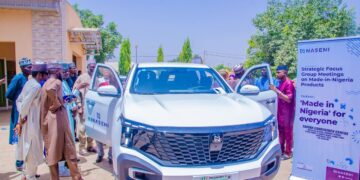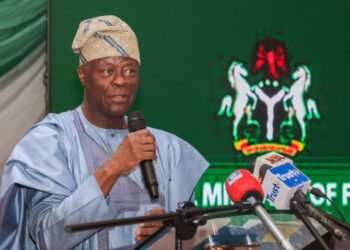By Tolu Ogunlesi
“I wish to restate my commitment that getting 100 million Nigerians out of poverty is realisable. The country is robustly blessed with good weather conditions, good soil, human and material capacity, and a resilience to make a difference by all the hardworking youths. We can do it, and we will do it. No excuse will be good enough to remain a mono-economy with all the challenges in oil production and fluctuating global prices when we have vast opportunities in crop and livestock production.” — President Muhammadu Buhari, July 19, 2021
One of the pillars of President Buhari’s Agricultural vision (incremental progress towards self-sufficiency) is the National Agricultural Land Development Authority.
NALDA is not a new Federal agency (it was established in 1992) but it’s been dormant since around 2000, until last year when President Buhari revived it, appointed Prince Paul Ikonne as Executive Secretary and CEO (June 2020), and directed that it be domiciled in the Presidency for direct supervision by him.
In November 2020, NALDA launched the National Young Farmers Scheme, at an event presided over by the President. The Scheme seeks to annually engage and support 1,000 young farmers in each of Nigeria’s 774 Local Government Areas.
“I have directed that all NALDA’s abandoned farm estates be retrieved to enable thousands of our young men and women to be engaged in farming,” the President said, at that flag-off event.
WHAT’S AN INTEGRATED FARM ESTATE?
Ideally sited in a rural community, it is developed to achieve a number of objectives, including job creation (especially for youth and women), community development, and reduction of rural-urban migration.
The Farm Estates are designed to fit the particular context of a host community (i.e. cultivate crops and/or livestock peculiar to the community), and to directly benefit members of the host community. In other words, the Farms will be staffed by people from the host community and surrounding areas.
Each Farm Estate will be provided with support facilities like residential housing, schools, human and veterinary clinics, access roads, clean water and so on.
Farm Estates are not a land-grab attempt, not an imposition on communities. They are Agricultural development initiatives financed by the Federal Government and designed to be run/ managed/operated by local (host) communities.
SO WHAT HAS HAPPENED
since the President ordered the resuscitation of the Farm Estates?
The first set of revived Farm Estates have gone into operation, in Katsina and Yobe States.
The Katsina Farm Estate was commissioned by the President on Monday July 19, 2021. It sits on 100 hectares of land (80ha for crops and 20ha for livestock), made available by the Katsina State Government, in Daura. It has a poultry capacity of 400,000 birds and a fisheries capacity of 200,000 fish; as well as facilities for rearing cows, goats, rabbits and bees.
The Daura Farm Estate, designed to serve 13 communities, also has residential facilities (120 one-bedroom apartments for farmers).
On Saturday, September 25, 2021, the Senate President commissioned an Integrated Farm Estate in Gasamu, Jakusko LGA of Yobe State. This Estate sits on 20 hectares of land, and has the capacity for 30,000 birds, which will produce an estimated 850 crates of eggs daily, as well as an incubation center that will annually produce 250,000 Noilers (a cross between male broilers and pullets, designed to produce both meat and eggs), for sale as day-old birds to farms nationwide.
So, we now have two operational Integrated Farm Estates in Nigeria, in two States that have enthusiastically signed up for the program and donated land.
In the months ahead, similar Farm Estates will spring up across the country. Clearly, the more enthusiastic a State is to plug into this program, the quicker it will get a functioning Farm Estate.
SO WHERE DOES NALDA GET ITS LAND FROM?
1. It has land belonging to it, allocated from its first incarnation in the 1990s, and which it is now recovering and redeveloping.
2. Voluntary donations from States. Abia, Borno, Kogi, Yobe, Oyo, Ebonyi, Kwara, Niger, Katsina have all donated land for the establishment of Integrated Farm Estates. Other interested States are sure to follow suit.

































